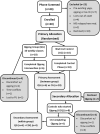Community qigong for People with Multiple Sclerosis: A Pragmatic Feasibility Study
- PMID: 33769837
- PMCID: PMC9030260
- DOI: 10.1089/acm.2020.0481
Community qigong for People with Multiple Sclerosis: A Pragmatic Feasibility Study
Abstract
Objectives: qigong, a traditional Chinese mind-body exercise, has been shown to improve balance and gait in several neurological conditions; however, community-delivered qigong has never been assessed for people with multiple sclerosis (MS). The authors assessed the feasibility of community qigong classes for people with MS and explored outcomes of balance, gait, and quality of life (QOL). Design: Twenty adults with MS were randomly assigned to 10 weeks of community qigong classes or wait-list control. Settings/Location: Portland, Oregon. Subjects: People with MS. Intervention: Community qigong classes. Outcome measures: Feasibility criteria included recruitment, retention, adherence, and ability to participate in qigong movements. Secondary outcome measures included physical tests of mobility, gait, and balance and participant-reported mobility, depression, anxiety, fatigue, and QOL. Results: Recruitment of eligible and interested people with MS was feasible. Retention in the trial was 60%. Completers attended a mean of 7 of 10 classes. All completers participated with no or minor modifications to qigong movements. Exploratory within-group analyses showed trends toward improved mental health, QOL, and reduced fatigue and depression. Several participants spontaneously reported improved energy, flexibility, sleep, and mobility. Conclusions: Community qigong may be a feasible form of exercise for people with MS. To improve retention and capture potential effects of qigong on physical function and quality of life, future studies might consider pragmatic trials with tiered level classes, simpler forms of qigong, and/or refined inclusion criteria (CTR#: NCT04585659).
Keywords: gait; multiple sclerosis; pragmatic design; qigong.
Conflict of interest statement
L.B. has received payment for teaching
Figures


References
-
- National MS Society. What is Multiple Sclerosis?: National MS Society. Available at: https://www.nationalmssociety.org/What-is-MS/Definition-of-MS Accessed March 7, 2021.
-
- National MS Society. Symptoms: National MS Society. Available at: https://www.nationalmssociety.org/Symptoms-Diagnosis/MS-Symptoms Accessed March 7, 2021.
-
- Ben-Zacharia AB. Therapeutics for multiple sclerosis symptoms. Mt Sinai J Med A J Transl Pers Med 2011;78:176–191. - PubMed
-
- Peterson EW, Cho CC, von Koch L, Finlayson ML. Injurious falls among middle aged and older adults with multiple sclerosis. Arch Phys Med Rehabil 2008;89:1031–1037. - PubMed
MeSH terms
Associated data
Grants and funding
LinkOut - more resources
Full Text Sources
Other Literature Sources
Medical

